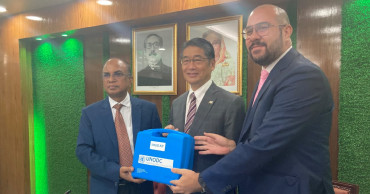Drug
How to Stay Safe from Devil's Breath
Several alarming incidents have recently been reported in Dhaka, where unsuspecting pedestrians became victims of criminals using "Devil's Breath." According to eyewitness accounts, strangers approached passersby, asking for directions while holding slips of paper with addresses written on them. Moments later, victims reportedly lost awareness, willingly handing over valuables to the perpetrators without resistance. Authorities have expressed growing concern over the rising frequency of crimes involving this substance, known to swiftly incapacitate individuals, making them easy targets for robbery and theft.
What is Devil’s Breath?
Devil’s Breath, also known as scopolamine or burundanga, is a powerful and dangerous drug derived from the seeds of the Borrachero shrub, common in the South American country of Colombia. The drug is a tropane alkaloid with potent anticholinergic effects, often used by criminals to incapacitate victims, rendering them highly suggestible and unable to resist.
When administered in large doses, it causes amnesia, confusion, hallucinations, and loss of free will, making victims easy targets for robbery, assault, or even worse crimes. Unlike common misconceptions, Devil’s Breath is typically ingested through food or drink rather than being absorbed through the skin or inhaled. The drug blocks muscarinic receptors in the brain, disrupting cognitive functions and leading to severe disorientation.
Read more: Should You Drink Hot or Cold Water?
In medical settings, scopolamine is used in small doses to treat motion sickness, nausea, and gastrointestinal disorders, but when misused, it becomes a dangerous tool for criminals. Victims often wake up with no memory of the events, making it difficult to report or prosecute the crimes.
How to Stay Safe from Devil’s Breath?
.
Be Cautious with Strangers
Criminals often pose as friendly individuals to gain your trust. They may offer assistance, ask for directions, or hand you an object laced with the substance. You should avoid accepting anything from strangers, especially in unfamiliar environments. If someone insists on handing you something, politely refuse and walk away.
Never Accept Food or Drinks from Strangers
One of the most common methods of administering Devil’s Breath is by spiking food or beverages. If you are in a public place such as a nightclub, or restaurant, always keep an eye on your food and drink. It is important to never accept drinks or food from strangers, and if you leave your drink unattended, discard it immediately.
Read more: How to Fix Your Sleep Routine: Know the Do's and Don'ts
Stay Alert in Crowded Places
Busy environments such as public transport stations, markets, and tourist attractions provide an ideal setting for criminals to operate unnoticed. You need to be aware of your surroundings and stay vigilant. If you feel dizzy, disoriented, or excessively drowsy, seek help immediately from a trusted individual or law enforcement officer.
Use Secure Transportation
Unlicensed taxis and unverified ride-sharing services pose significant risks. Many cases of Devil’s Breath-related crimes involve victims being drugged in unauthorized vehicles. So, it is highly recommended to always use official transport services, verify the driver’s identity, and avoid getting into a vehicle with strangers, especially at night.
Travel in Groups
There is safety in numbers. Traveling with friends or family reduces the likelihood of being targeted. If you must go out alone, inform someone of your whereabouts and estimated return time. Also, you should avoid isolated areas and stay in well-lit public spaces.
Read more: How to Stay Safe from Snakes During and After Flood
Wear a Face Mask or Cover Your Nose and Mouth
Since Devil’s Breath can be administered in powdered form and blown into a victim’s face, wearing a mask provides a protective barrier. If you suspect someone is trying to use this method on you, cover your nose and mouth immediately and leave the area.
Trust Your Instincts
If a situation feels unsafe or someone’s behavior seems suspicious, you should remove yourself from the environment immediately. It is better to avoid engaging with strangers who make you uncomfortable and do not hesitate to seek help if needed.
Secure Your Home and Accommodation
Criminals may use Devil’s Breath in home invasions by blowing it through windows or air vents. It is necessary to ensure that doors and windows are locked, especially at night. If staying in a hotel or Airbnb, confirm that the place has adequate security measures in place.
Read more: Effective Home Remedies to Combat Bad Breath
Be Mindful of Personal Items
Try to avoid handling unfamiliar objects given to you by strangers. Items such as business cards, flyers, money, or papers could be laced with Devil’s Breath. If you must handle such objects, wash your hands thoroughly afterward and avoid touching your face.
Avoid Public Displays of Wealth
Carrying large amounts of cash, expensive jewelry, or high-end gadgets makes you a target. Criminals are more likely to use Devil’s Breath on individuals they perceive as wealthy. It would be better to opt for digital payments and keep valuables concealed in public places.
Stay Informed and Educate Others
Knowledge is one of the best defenses against criminal activities. Stay updated on reports of Devil’s Breath incidents in your area and share safety tips with friends, family, and colleagues. Awareness helps prevent more people from falling victim.
Read more: How to Teach Students to Accept and Overcome Academic Failures
Have Emergency Contacts Ready
It is a must to save emergency numbers in your phone and keep a physical copy as well. In case of an emergency, you should be able to reach out to law enforcement, medical services, or a trusted friend or family member.
Know the Symptoms of Exposure
If you suspect you have been exposed to Devil’s Breath, recognizing the symptoms early can be life-saving. Symptoms include confusion, dizziness, hallucinations, dry mouth, blurred vision, and loss of muscle control. If you experience these effects, seek medical help immediately and inform healthcare providers of the suspected exposure.
Seek Medical Attention Immediately
If you or someone you know has been drugged, get medical assistance as soon as possible. Time is critical, and healthcare professionals can provide necessary treatment to minimize the effects. It is suggested to avoid going home alone, as symptoms may worsen over time.
Read more: Strategies for Cooling Your Roof During Intense Summer Heat
Report Suspicious Activity
If you encounter suspicious individuals or situations that suggest an attempted Devil’s Breath attack, report them to the authorities. Providing information can help prevent future incidents and protect others.
Final Words
Staying safe from Devil’s Breath requires awareness, vigilance, and preventive measures. By being cautious with strangers, securing your belongings, and recognizing the signs of exposure, you can reduce the risk of becoming a victim. Always trust your instincts, seek medical help if needed, and educate others about the dangers of this dangerous substance. Your safety and well-being depend on your preparedness and awareness.
Read more: Circadian Rhythm: How to Reset the Biological Master Clock
1 year ago
Once a den of drug addicts, Ctg DC Park is now a kingdom of flowers
DC Park in Chattogram’s Fouzdarhat has become place of attraction for city dwellers for vibrant display of colourful flowers along the sea beach after the district administration developed the park inspired by Dubai's renowned Miracle Garden.
A month-long flower festival will begin at the park on Thursday (January 25, 2024) evening.The festival, organized for the second time, promises a delightful experience for visitors with a collection of 127 species of exotic flowers. In addition to the floral extravaganza, the event features added attractions such as kite flying, traditional sweets festival, boat exhibitions, art displays, and a music festival.
Read more: A festival of flowers in ChattogramOnce infamous as a drug den near the Fouzdarhat area on the Link Road in Chattogram city, DC Park was transformed into a 194-acre park by the district administration.The various species of flowers capture the attention of visitors, not just through their colours but also through the artistic arrangements.
2 years ago
Man held with drugs at Teknaf
Members of Border Guard Bangladesh (BGB) arrested a man along with 1.13 kgs of crystal meth, 3,000 Yaba pills, 20 kgs of current nets from a boat in the Naf River in Teknaf upazila of Cox’s Bazar district early Wednesday.
The arrestee was identified as Md Rifat alias Bila, 21, son of Shamsul Alam of the upazila.
Tipped off, a team of BGB-2 conducted a drive in the area around 2:25 am and challenged a boat while crossing the border, said commanding officer of BGB-2 Lieutenant Colonel Md Mohiuddin Ahmed.
Later, the BGB men arrested Bila while another man managed to flee the scene.
After searching the boat, the BGB men seized the contraband items.
2 years ago
Alzheimer’s drug approval ‘rife with irregularities’: Probe
The Food and Drug Administration’s contentious approval of a questionable Alzheimer’s drug took another hit Thursday as congressional investigators called the process “rife with irregularities.”
The 18-month investigation by two House committees detailed “atypical collaboration” between FDA regulators and a company it’s supposed to oversee -- Aduhelm manufacturer Biogen. The probe also cited Biogen documents saying the company intended to “make history” when it set what investigators called an “unjustifiably high” initial price of $56,000 a year for the drug.
The criticism comes as the FDA is expected to decide whether to approve another new Alzheimer’s drug in January. Thursday’s report urged the agency to “take swift action” to ensure that any future Alzheimer’s approvals aren’t met with “the same doubts about the integrity of FDA’s review.”
Read more: Drug slows Alzheimer's but can it make a real difference?
The FDA and Biogen issued statements Thursday defending the Aduhelm approval process.
In 2021, the FDA overruled its own independent scientific advisers when it approved Aduhelm even though research studies failed to prove it really helped patients. Biogen had halted two studies after disappointing results suggested the drug wasn’t slowing Alzheimer’s inevitable worsening -- only to later contend that a new analysis of one study showed higher doses offered an incremental benefit.
The FDA argued the drug’s ability to reduce a hallmark of Alzheimer’s, a buildup of plaque in the brain, suggested it was likely to slow the disease. Backlash was immediate as three FDA advisers resigned in protest and the agency’s then-acting chief called for an internal investigation. Eventually Medicare refused to pay for the drug -- even after the yearly price was dropped to $28,000 -- unless patients enrolled in clinical trials to prove if it indeed slowed cognitive decline.
Thursday’s report said FDA and Biogen engaged in an unusually high volume of phone calls, meetings and emails, some of them not properly documented. In addition, the regulators and company spent months working together to prepare a briefing document for FDA’s advisers that didn’t adequately represent substantial disagreement within the FDA about how to handle Aduhelm, the report said.
Read more: Alzheimer's Disease: Symptoms, Causes, Preventions
The investigators recommended that FDA take steps to restore trust in the approval process that include properly documenting interactions with drugmakers. They also urged manufacturers to take into account advice from patient groups and other outside experts on fair drug pricing.
In a statement Thursday, FDA said the Aduhelm decision “was based on our scientific evaluation of the data” and that the agency’s own internal review found its interactions with Biogen were appropriate. But it said it plans to update guidance on Alzheimer’s drug development and will review the investigation’s findings.
In its own statement, Biogen said: “Alzheimer’s is a highly complex disease and we have learned from the development and launch of Aduhelm” but that it “stands by the integrity of the actions we have taken.”
3 years ago
Drug slows Alzheimer's but can it make a real difference?
An experimental Alzheimer’s drug modestly slowed the brain disease’s inevitable worsening, researchers reported Tuesday -- but it remains unclear how much difference that might make in people’s lives.
Japanese drugmaker Eisai and its U.S. partner Biogen had announced earlier this fall that the drug lecanemab appeared to work, a badly needed bright spot after repeated disappointments in the quest for better Alzheimer’s treatments.
Now the companies are providing full results of the study of nearly 1,800 people in the earliest stages of the mind-robbing disease. The data was presented at an Alzheimer’s meeting in San Francisco and published in The New England Journal of Medicine. U.S. regulators could approve the drug as soon as January.
Read more: Coronavirus can destroy the placenta and lead to stillbirths
Every two weeks for 18 months, study participants received intravenous lecanemab or a dummy infusion. Researchers tracked them using an 18-point scale that measures cognitive and functional ability.
Those given lecanemab declined more slowly -- a difference of not quite half a point on that scale, concluded the research team led by Dr. Christopher van Dyck at Yale University.
That’s a hard-to-understand change, but measured a different way, lecanemab delayed patients’ worsening by about five months over the course of the study, Eisai’s Dr. Michael Irizarry told The Associated Press. Also, lecanemab recipients were 31% less likely to advance to the next stage of the disease during the study.
“That translates to more time in earlier stages” when people function better, Irizarry said.
But doctors are divided over how much difference those changes may make for patients and families.
“It is unlikely that the small difference reported in this trial will be noticeable by individual patients,” said Dr. Madhav Thambisetty of the National Institute on Aging, who noted he wasn’t speaking for the government agency.
He said many researchers believe a meaningful improvement would require at least a difference of a full point on that 18-point scale.
But Dr. Ron Petersen, an Alzheimer’s expert at the Mayo Clinic, said the drug’s effect was “a modest one but I think it’s clinically meaningful” -- because even a few months’ delay in progression could give someone a little more time when they’re functioning independently.
The trial is important because it shows a drug that attacks a sticky protein called amyloid -- considered one of several culprits behind Alzheimer’s -- can delay disease progression, said Maria Carrillo, chief science officer for the Alzheimer’s Association.
“We all understand that this is not a cure and we’re all trying to really grasp what it means to slow Alzheimer’s, because this is a first,” Carrillo said.
But any delay in cognitive decline early on could be meaningful for “how much time we have with our loved ones in a stage of disease where we can still enjoy family and outings, vacations, bucket lists,” she said.
Amyloid-targeting drugs can cause side effects that include swelling and bleeding in the brain, and lecanemab did as well. One type of this swelling was seen in about 13% of recipients. Eisai said most were mild or asymptomatic.
Read more: Successful transplant of pig's heart into a human body for the first time
Also, two deaths have been publicly reported among lecanemab users who also were taking blood-thinning medications for other health problems. Eisai said Tuesday the deaths can’t be attributed to the Alzheimer’s drug.
But Mayo’s Petersen said if lecanemab is approved for use in the U.S., he’d avoid prescribing it to people on blood thinners at least initially.
And Thambisetty said the death reports raise concern about how the drug may be tolerated outside of research studies “where patients are likely to be sicker and have multiple other medical conditions.”
The Food and Drug Administration is considering approving lecanemab under its fast-track program, with a decision expected in early January. If approved, it would be the second anti-amyloid drug on the market.
Nearly all treatments available for the 6 million Americans with Alzheimer’s — and millions more worldwide — only temporarily ease symptoms. Scientists don’t yet know exactly how Alzheimer’s forms but one theory is that gunky amyloid buildup plays a key role, although drug after drug that targets it has failed.
In a contentious move last year, the FDA approved the first amyloid-targeting drug, Biogen’s Aduhelm, despite lack of evidence of better patient outcomes. Insurers and many doctors have hesitated to prescribe the pricey drug -- another reason experts have anxiously awaited word of how well the newer lecanemab may work.
If the FDA approves lecanemab, patients and their families will need a voice in deciding whether it’s worth the hassle of IV infusions and the risk of side effects for the chance of at least some delay in progression, Petersen said.
“I don’t think we’re going to stop the disease in its tracks” with just amyloid-targeting drugs, he added, saying it will take a combination of medications that target additional Alzheimer’s culprits.
Researchers are preparing to test lecanemab with other experimental drugs, and how it works in high-risk people before they show the first signs of memory problems.
3 years ago
“Well-off individuals as well as journalists, police also involved in drug trade”
Home Minister Asaduzzaman Khan Kamal today said that well-off individuals as well as journalists and police are also involved in drug trade, and they too face justice without exception.
The minister made the remark while speaking at a roundtable meeting in Dhaka’s CIRDAP auditorium.
“In prison, you will find police, Rab personnel along with businessmen in narcotic cases. Law is not different for policemen,” he said.
Also read: “Govt, law enforcement alone can’t eradicate drugs, need help from all”
Regarding dope test, the home minister said police are going under dope tests and if results are positive, they are being suspended. “We have taken a strict position in this regard,” he said.
He said dope test during initial selection for jobs will be introduced.
“It is said that doctors are the ones who are mostly into drug abuse but I have no idea about this. Doctors, engineers, journalists – anyone of us can take drugs, as there are misguided people in every profession,” he added.
Also read: 44 arrested in DMP anti-drugs drive
To curb drug abuse, the government is not only running newspaper supplements but also producing short TVCs – generating awareness, increasing manpower and capacity of Narcotics Control Directorate in every district and setting up labs, he said.
Asaduzzaman said the capacity of jails in Bangladesh is more than 41,000 and it will be increased soon. But there are more than 80 lakh inmates and 60 percent of them are drug peddlers, he said.
“There is long backlog of cases, and a separate special tribunal for drugs cases is needed. If the punishment becomes more visible, both supply and demand of drugs will decline,” he said.
Read Bangladesh gets drug, precursor test kits from Japan through UNODC
There are 6 to 7 million drug addicts in Bangladesh, for whom no quality hospital is available, he said.
“Our drug addiction treatment centers do not have experienced doctors or psychiatrists. No one from upper and middle-class goes to the drug treatment center in Tejgaon,” said the home minister.
He assured that government will support the establishment of drug addiction treatment centers in Bangladesh through the private sector.
Read Drug peddler held with yaba pills in Dhaka
3 years ago
Bangladesh gets drug, precursor test kits from Japan through UNODC
Japanese Ambassador to Bangladesh Ito Naoki and the delegates from the United Nations Office on Drugs and Crime (UNODC) Thursday handed over drug and precursor test kits, funded by the government of Japan, to the Department of Narcotics Control (DNC).
Naoki said Japan attaches great importance to the implementation of a "Free and Open Indo-Pacific (FOIP)," a vision to secure peace, stability and prosperity in the region,
"We will continue to work with Bangladesh to realise the vision through various practical cooperation, including the capacity building of law enforcement agencies."
Md Abdul Wahab Bhuiyan, director general of the DNC, said Japan has been a time-tested friend and biggest development partner of Bangladesh and the country would like to continue to cooperate with Japan to strengthen its control capability of drug trafficking.
Also read: BGB seizes drugs worth Tk 12 crore in Cox's Bazar
3 years ago
Drug peddler held with yaba pills in Dhaka
Rapid Action Battalion (Rab) Friday claimed to have arrested a man from the city's Hatirjheel on charges of selling yaba pills.
Rab-3 conducted a drive in Hatirjheel's Mirbagh area at 9:30pm and arrested Arif Babu, 38, from Gosairhat upazila, Shariatpur.
Around 765 yaba pills, mobile phones, SIM cards, one knife and Tk2,160 were recovered from the possession of the accused, Rab sources told UNB.
Read: Police arrest 3 with Yaba pills in Brahmanbaria
During preliminary interrogation, the arrestee said he is an active member of a drug smuggling ring
Arif buys yaba pills from Cox's Bazar and sells them to different areas of the capital, according to Rab.
"Legal action has been taken against him," it added.
3 years ago
2 ‘drug peddlers’ held in Teknaf
Border Guard Bangladesh (BGB) members detained two suspected drug peddlers along with 4,315 kgs of crystal meth and one lakh Yaba pills from Hinla area in Teknaf upazila of Cox’s Bazar district Wednesday night.
The detainees were Abdur Rahman, 30, son of Kader Box and Mohammad Nur, 25, son of Abdus Salam of the district.
Tipped off, a team of BGB-2 conducted a drive in the area and challenged two people coming from the bordering area, said commanding officer of BGB-2 Lieutenant Colonel Khalid Mohammad Iftekhar.
Read: Ansarullah Bangla Team member held in Nilphamari
Later, the BGB men seized 4,315 kgs of crystal meth worth Tk 21.57 crore and one lakh Yaba pills worth Tk 3 crore from a bag and detained the duo.
Process is underway to hand the detainees to police, said BGB.
3 years ago
Two drug peddlers held in Dhaka
Rapid Action Battalion (Rab) has claimed to have nabbed two drug peddlers with over 350 bottles of Phensedyl from the capital’s Jatrabari area.
The arrestees have been identified as Md Jewel, 36, and Md Sakhawat Hossain, 32.
On a tip-off from the intelligence wing, a Rab-3 team set up a couple of checkposts in the Jatrabari area on Friday night and managed to nab the peddlers travelling in a car around 10.30pm.
As many as 353 bottles of Phensedyl and their car have been seized, the Rab said a release on Saturday.
READ: 3 drug peddlers held with 50,000 yaba pills
During initial interrogation, the duo admitted to their involvement in durg peddling. "They used to source Phensidyl from Cumilla and sold the same across Dhaka," said Beena Rani Das, Rab assistant director (operations and intelligence branch).
A case has been filed against the arrestees at the Jatrabari police station, she added.
3 years ago


















